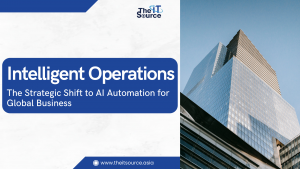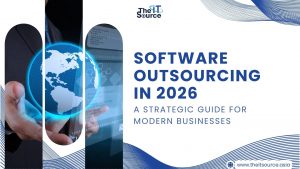AI services: Benefits and real-world applications
Why AI is no longer optional for modern businesses
AI has evolved from an experimental edge into a mission-critical capability. Especially in the context of European markets where customer expectations, regulatory frameworks, and cross-border complexity converge, businesses can no longer afford to treat AI as an add-on or innovation side project.
Whether it’s a manufacturing firm in Germany, a logistics startup in the Netherlands, or a fintech scale-up in the Nordics, the pressure to stay agile, data-driven, and competitive is universal. AI provides the tools to adapt quickly, make informed decisions, and enhance customer experiences at scale.
From streamlining support operations to predicting future trends, AI for business is not just enabling automation; it’s unlocking strategy. And thanks to the rapid growth of cloud-native AI services, enterprise-grade capabilities are now within reach of even mid-sized companies, not just industry giants.
This article, from The IT Source – a trusted partner in AI and digital transformation, explores how AI services are delivering real value across industries and what European enterprises can learn from real-world applications.
Unlocking business value: Key benefits of AI Services
1. Operational efficiency and cost savings
At its core, AI delivers speed and precision, two qualities every business can benefit from. AI services powered by machine learning and RPA (Robotic Process Automation) are helping enterprises eliminate time-consuming manual processes.
Invoice processing, contract verification, shipment tracking, and staff scheduling can now be fully or partially automated. In one European case, a logistics company reduced its invoice approval time from 5 days to just a few hours using an AI-driven document workflow solution.
This efficiency doesn’t just reduce overhead. It frees up human employees to focus on strategic work, improving internal morale while driving measurable business performance.
2. Personalized customer experiences
Today’s customers both B2C and B2B expect personalization, not generic responses. With Customer Service AI, companies can engage with users based on their history, intent, preferences, and even tone of voice.
AI can suggest solutions before a customer finishes typing. It can detect frustration and escalate issues automatically. More importantly, it ensures brand consistency across channels from live chat and email to voice and social platforms.
According to Zendesk, businesses using conversational AI saw not only faster resolution times, but also a 35% increase in repeat engagement customers return when they feel understood.
3. Smarter decision-making
AI doesn’t just react it predicts. Businesses are using AI-powered analytics to forecast market demand, flag anomalies in supply chains, and simulate pricing scenarios. These tools empower leadership teams to make proactive decisions rather than reactive ones.
For example, in the food retail industry, AI models trained on historical sales, weather, and local events can predict regional demand fluctuations. This enables more accurate restocking and reduced waste especially important in sustainability-conscious European markets.
By combining structured ERP data with unstructured customer feedback (like reviews and support tickets), AI can surface trends that humans would miss giving companies a deeper, real-time understanding of their market.
4. Compliance and risk mitigation
Nowhere is AI’s value more evident than in regulated industries. In finance, healthcare, and insurance where compliance is mandatory and audits are frequent AI services are being used to continuously monitor and flag risk.
Natural language processing (NLP) tools can scan legal documents for risky clauses. AI models can identify unusual customer behavior in real time, triggering alerts for fraud or AML (Anti-Money Laundering) review.
A European bank using AI-based KYC automation shortened onboarding times by 40% and improved audit-readiness by maintaining detailed, timestamped decision logs something traditional systems struggled to provide consistently.
Real-world applications across industries
1. Retail: Dynamic pricing and demand forecasting
Retailers are deploying AI to adjust pricing dynamically based on real-time data such as competitor pricing, inventory levels, and buying patterns. This enables businesses to maintain competitiveness without undermining margins.
For example, Zalando applies AI to predict which products are likely to go out of stock and adjusts marketing efforts accordingly. This combination of dynamic pricing and predictive demand increases inventory efficiency while improving customer satisfaction.
2. Customer service: Conversational AI and 24/7 support
Chatbots and AI agents are now capable of handling complex inquiries, booking services, processing refunds, and even cross-selling products. Their availability around the clock gives companies an edge in responsiveness and cost control.
UK telecom providers, for example, use multilingual AI agents to handle up to 80% of inbound queries. Human agents now focus on escalations and sensitive cases, improving both customer experience and staff engagement.
3. Healthcare: Diagnostics and patient engagement
AI in healthcare isn’t just about operational savings it can improve lives. AI models are trained to detect anomalies in X-rays, MRIs, and CT scans with increasingly high accuracy, acting as second-opinion tools for radiologists.
Helios clinics in Germany use AI for early-stage cancer detection and automated appointment scheduling, resulting in both reduced clinician burnout and faster patient service delivery.
4. Manufacturing and logistics: Predictive maintenance
Equipment failure in manufacturing can halt production and incur massive costs. AI solutions that analyze vibration data, temperature fluctuations, and machine logs can detect issues before they become failures.
DHL’s predictive maintenance system helps prevent unplanned downtime in over 30 European fulfillment centers. Combined with AI-driven routing optimization, this has lowered costs and improved on-time delivery KPIs across the continent.
The European advantage: Ethical, transparent, and secure AI
Europe’s unique legal environment makes the region both a challenge and an opportunity for AI adoption. Regulations such as GDPR and the upcoming EU AI Act require businesses to be accountable, transparent, and explainable in their use of AI.
This has created a surge in demand for AI services that are not only effective but also ethical by design. Vendors are now expected to provide clear documentation, opt-in consent processes, and tools for human review.
As a result, European companies have a competitive edge when it comes to trust. They’re demonstrating how responsible AI can be both a regulatory necessity and a business asset.
Implementation tips: How to succeed with AI for business

Implementation tips: How to succeed with AI for business
- Start with real pain points: Don’t begin with technology begin with business challenges. AI should solve specific problems, not become another digital tool searching for relevance.
- Invest in data quality: Clean, labeled, representative data is the foundation of any good model. Without it, even the best AI algorithms will fail.
- Train your people not just your models: Staff need to understand how to interact with AI, when to trust it, and how to challenge its output when necessary.
- Pilot small, measure big: Start with proof-of-concept projects, but always attach clear metrics: CSAT, time saved, conversion uplift, etc.
- Choose partners who understand your sector: AI without domain knowledge is risky. The best implementations come from vendors who know your regulations, customer base, and business model.
AI is business-critical, not just a buzzword
As the digital economy evolves, AI for business is moving from optional to indispensable. From Customer Service AI that anticipates needs to compliance systems that operate 24/7, the business case for AI has never been stronger.
Those that invest wisely in AI services now will build the agility, resilience, and innovation capacity needed to lead in Europe’s competitive B2B landscape.
Need help identifying the right AI solution for your organization?
Contact The IT Source – your partner for AI-driven transformation in the EU and beyond.


 日本語
日本語

